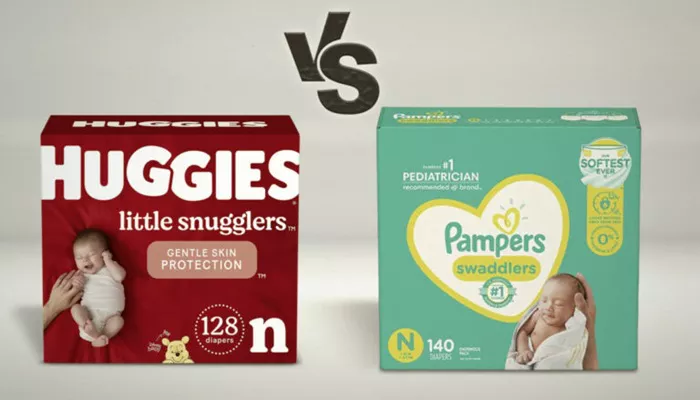When it comes to choosing diapers for their babies, parents often find themselves in a dilemma between Pampers and Huggies. Both brands are renowned for their quality and reliability, but a significant factor influencing the decision is the cost. In this article, we will explore whether Pampers are more expensive than Huggies by analyzing various aspects, including price per diaper, bulk buying, subscription services, and overall value for money.
A Detailed Comparison of Pampers and Huggies Prices
Price Per Diaper
One of the most straightforward ways to compare the cost of Pampers and Huggies is by looking at the price per diaper. Prices can vary depending on the size and type of diaper. Generally, newborn and smaller sizes tend to be cheaper than larger sizes.
Pampers Price Per Diaper
Pampers offers a wide range of diaper types, including Swaddlers, Cruisers, and Pure Protection. On average, the cost per diaper for Pampers Swaddlers (size 1) is around $0.25 to $0.30. As the size increases, so does the price per diaper. For instance, size 4 Swaddlers can cost between $0.34 to $0.38 per diaper.
Huggies Price Per Diaper
Huggies also has various diaper types, such as Little Snugglers, Little Movers, and Special Delivery. The average price per diaper for Huggies Little Snugglers (size 1) ranges from $0.23 to $0.27. For larger sizes like size 4, the price per diaper is approximately $0.32 to $0.36.
Bulk Buying: Savings and Costs
Many parents opt to buy diapers in bulk to save money. Both Pampers and Huggies offer bulk packages that can significantly reduce the cost per diaper.
Pampers Bulk Buying
Pampers provides several options for bulk purchases, often available through retailers like Amazon, Walmart, and Costco. A bulk package of Pampers Swaddlers (size 1) containing 198 diapers can cost around $45 to $50, bringing the price per diaper down to about $0.25.
Huggies Bulk Buying
Similarly, Huggies offers bulk packages through major retailers. A bulk package of Huggies Little Snugglers (size 1) with 198 diapers typically costs between $40 to $45, reducing the price per diaper to approximately $0.23.
SEE ALSO: How Many Diapers Are in Pampers Super Pack?
Subscription Services: Convenience and Cost
Subscription services can offer convenience and additional savings for busy parents. Both Pampers and Huggies have subscription options through platforms like Amazon’s Subscribe & Save.
Pampers Subscription Service
With a subscription service, parents can save up to 20% on Pampers diapers. For example, a monthly subscription of Pampers Swaddlers (size 1) might cost around $40 for 198 diapers, lowering the price per diaper to about $0.20.
Huggies Subscription Service
Huggies also provides savings through subscription services, typically around 20%. A subscription for Huggies Little Snugglers (size 1) might cost $36 for 198 diapers, reducing the price per diaper to approximately $0.18.
Overall Value for Money
While price is a crucial factor, the overall value for money also depends on other aspects such as absorbency, comfort, and skin sensitivity. Both Pampers and Huggies have their strengths in these areas, which can influence the perceived value.
Pampers Value for Money
Pampers diapers are known for their softness, excellent absorbency, and wetness indicator. They are especially popular for newborns and infants due to their gentle material and effective leakage protection. The added features may justify the slightly higher price for some parents.
Huggies Value for Money
Huggies diapers are praised for their snug fit, high absorbency, and hypoallergenic properties. The Little Movers line is particularly favored for active babies. Huggies often comes at a slightly lower price point, which can make them more attractive for budget-conscious parents.
Additional Costs and Considerations
When comparing the costs of Pampers and Huggies, it’s essential to consider any additional costs that might arise, such as shipping fees, loyalty programs, and store-specific discounts.
Shipping Fees
Online purchases often come with shipping fees unless a minimum purchase amount is met. Both Pampers and Huggies products can qualify for free shipping on platforms like Amazon when purchasing in bulk or through a subscription.
Loyalty Programs
Retailers and manufacturers sometimes offer loyalty programs that provide additional savings. Pampers has the Pampers Club, where parents can earn rewards points on purchases. Huggies has the Huggies Rewards+ program, which offers similar benefits.
Store-Specific Discounts
Different retailers may offer discounts and promotions on Pampers and Huggies diapers. Stores like Walmart, Target, and Costco often have sales or coupons that can significantly reduce the overall cost.
Environmental and Ethical Considerations
For some parents, the decision between Pampers and Huggies extends beyond cost and quality. Environmental and ethical considerations can play a significant role.
Pampers Environmental Impact
Pampers has made efforts to become more environmentally friendly with their Pure Protection line, which uses plant-based materials and is free from chlorine bleaching, fragrances, and latex. However, traditional Pampers diapers are not biodegradable and contribute to landfill waste.
Huggies Environmental Impact
Huggies has also introduced more sustainable options, such as the Special Delivery line, which uses plant-based materials and is free from harsh chemicals. Huggies is working towards reducing its environmental footprint, but like Pampers, most of their diapers are not biodegradable.
Conclusion
In conclusion, whether Pampers are more expensive than Huggies depends on various factors, including the size, type, and purchasing method. Generally, Pampers tend to be slightly more expensive per diaper compared to Huggies. However, the overall value for money is subjective and depends on individual preferences and priorities.
Parents should consider the specific needs of their babies, their budget, and any additional benefits or discounts available. By weighing these factors, parents can make an informed decision that best suits their family’s needs.


